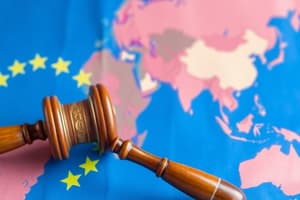Podcast
Questions and Answers
What characterizes the sources of international law compared to domestic law?
What characterizes the sources of international law compared to domestic law?
- International law sources derive from a single universal authority.
- Domestic law sources are often decentralized and complex.
- Domestic law does not require consent from states to create obligations.
- International law lacks a universal legislature and compulsory jurisdiction. (correct)
Which of the following is NOT considered a source of international law under Article 38(1) of the ICJ Statute?
Which of the following is NOT considered a source of international law under Article 38(1) of the ICJ Statute?
- International custom accepted as law
- General principles of law recognized by civilized nations
- Judicial decisions from local courts (correct)
- International conventions recognized by states
What principle ensures that treaties are binding on the parties involved?
What principle ensures that treaties are binding on the parties involved?
- Consensus ad idem
- Pacta sunt servanda (correct)
- Acta non verba
- Lex specialis derogat legi generali
What is a hallmark of a bilateral treaty?
What is a hallmark of a bilateral treaty?
Which of the following best describes the nature of consent in treaty law?
Which of the following best describes the nature of consent in treaty law?
What does 'general practice accepted as law' refer to in the context of international law?
What does 'general practice accepted as law' refer to in the context of international law?
How do the sources of international law differ from those of domestic law?
How do the sources of international law differ from those of domestic law?
Which of the following sources of international law is explicitly established and recognized by states through formal agreement?
Which of the following sources of international law is explicitly established and recognized by states through formal agreement?
What defines a constituent treaty?
What defines a constituent treaty?
Which of the following is NOT an element required for the formation of customary international law?
Which of the following is NOT an element required for the formation of customary international law?
In the context of state practice, what is the significance of the persistent objector rule?
In the context of state practice, what is the significance of the persistent objector rule?
What is the role of 'opinio juris' in customary international law?
What is the role of 'opinio juris' in customary international law?
Which of the following describes the 'general principles of law recognized by civilized nations'?
Which of the following describes the 'general principles of law recognized by civilized nations'?
What distinguishes 'hard law' from 'soft law' in international relations?
What distinguishes 'hard law' from 'soft law' in international relations?
What is emphasized by the requirement for 'consistency' in state practices regarding customary law?
What is emphasized by the requirement for 'consistency' in state practices regarding customary law?
In which of the following cases could evidence of customary law primarily be derived?
In which of the following cases could evidence of customary law primarily be derived?
What is a characteristic of generality in the formation of customary international law?
What is a characteristic of generality in the formation of customary international law?
What is one reason why soft law has become prominent in international environmental law?
What is one reason why soft law has become prominent in international environmental law?
What type of law does the International Law Commission (ILC) primarily aim to develop?
What type of law does the International Law Commission (ILC) primarily aim to develop?
Which of the following is a key aspect of judicial decisions in international law?
Which of the following is a key aspect of judicial decisions in international law?
Which of the following statements about the ICJ's decisions is true?
Which of the following statements about the ICJ's decisions is true?
In customary international law, what does the limitation of duration imply?
In customary international law, what does the limitation of duration imply?
Flashcards are hidden until you start studying
Study Notes
Sources of International Law
- International law is a decentralized legal system, where legal obligations can derive from multiple sources.
- Article 38(1) of the ICJ Statute outlines the main sources of international law:
- International conventions: Treaties are the most direct and formal way for states to create legal obligations. Treaties are based on state consent and only bind the consenting states. The principle pacta sunt servanda means states are obliged to honor their treaty-based obligations.
- International custom: Customary law arises from states following a general practice and accepting it as legally binding. It involves both objective (state practice) and subjective (belief in legal obligation) elements.
- General principles of law: Prevent the Court from being unable to decide a dispute due to lack of applicable law. Equity and good faith are key general principles.
- Judicial decisions and teachings of publicists: These are considered subsidiary means for determining rules of law, with ICJ decisions binding only on the parties to the case.
International Customary Law
- International customary law emerges from state practice accepted as legally binding.
- Objective element: State practice must be:
- Consistent: Reasonably uniform.
- Durable: Evolutive over time, through years of repeated behavior.
- General: Widespread participation.
- Subjective element (Opinio Juris): States must believe the practice is legally binding.
- The persistent objector rule allows a state to avoid being bound by an emerging customary rule by persistently objecting to the practice. This only applies to new customary rules.
- New states are bound by existing customary law.
Treaty Law
- Bilateral treaties: Govern a particular issue between two states, resembling a contract.
- Multilateral treaties: Have general application and possess ‘law-making’ features.
- Constituent treaties: Establish international organizations.
Soft Law
- Non-legally binding norms of behavior, compared to 'hard law' which is legally binding.
- Often used in international environmental law.
- Examples include the Stockholm Declaration and the Rio Declaration.
- Soft law instruments:
- Creation is generally faster and more flexible than hard law.
- Violations do not result in legal sanctions, but may carry political consequences.
- Resolutions and declarations adopted by the United Nations General Assembly are important forms of soft law.
Studying That Suits You
Use AI to generate personalized quizzes and flashcards to suit your learning preferences.



